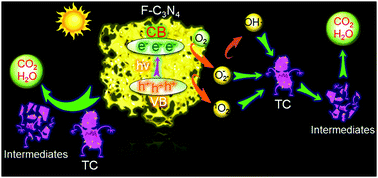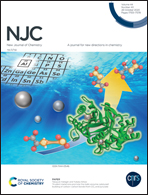Salt-templated synthesis of 3D porous foam-like C3N4 towards high-performance photodegradation of tetracyclines†
Abstract
Photocatalysis has emerged as an efficient method to treat highly noxious and persistent antibiotics such as tetracyclines (TCs) in the ecological environment. Carbon nitride (C3N4) is one promising photocatalyst, but the synthesis of C3N4 with a tunable chemical structure, extended visible-light harvesting, and strong photoactivity remains a challenge. Herein, 3D porous foam-like C3N4 (F-C3N4) was facilely prepared by thermal polycondensation of melamine with salt templates. F-C3N4 bears a hierarchically porous structure with a moderate specific surface area of 50.3 m2 g−1, which is 12 times higher than that of bulk C3N4. Besides, F-C3N4 shows a shorter average lifetime of photoexcited charge carriers and a stronger photocurrent response than bulk C3N4, since the hierarchical pores and functional groups of F-C3N4 promote the migration of photoinduced charge carriers. The high photocatalytic activity of F-C3N4 is displayed in the degradation of TC, for which the kinetic constant is 64 times higher than that of bulk C3N4. Finally, the photodegradation mechanism of TC is revealed by detecting reactive oxygen species such as OH˙, 1O2 and O2˙− through electron paramagnetic resonance, as well as analyzing the intermediate degradation products of TC. This work provides a facile method to prepare porous C3N4 with a remarkably enhanced photocatalytic activity.



 Please wait while we load your content...
Please wait while we load your content...